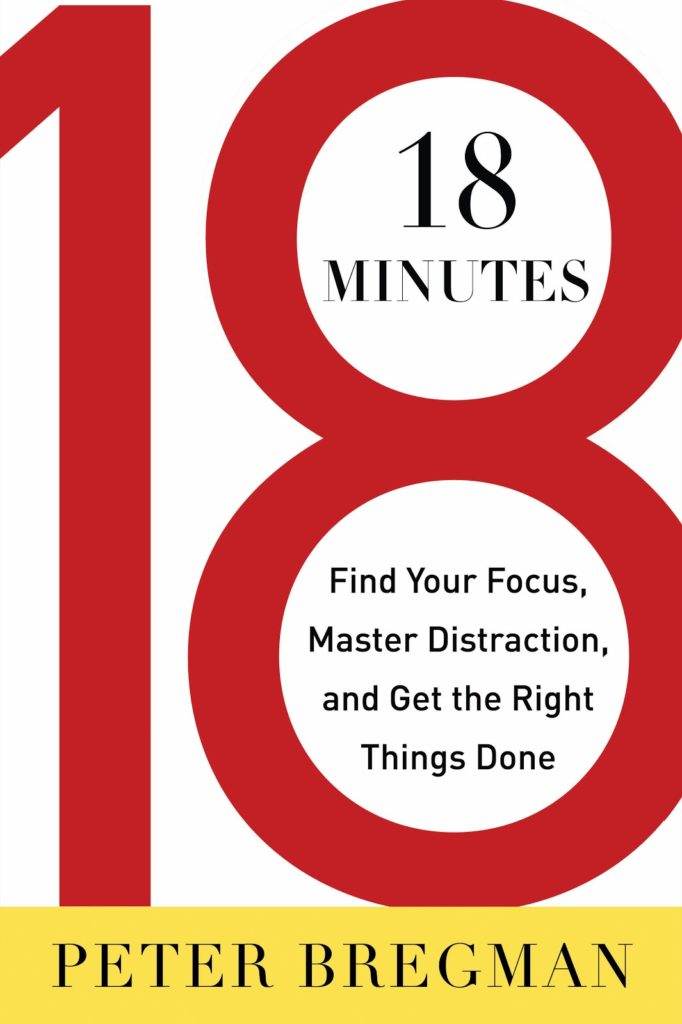
Have you wondered why some people can accomplish so much with their lives, while others simply drift by?
The answer to that is time management. Or more precisely, managing the months, weeks, days and hours of your time.
“Time is the only element in the world that is irretrievable when lost.
Lose money and you can make more.
Lose a friend and you can patch up the relationship.
Lose a job and you can find another.
But lose time and it’s gone forever.”
So says a paragraph from Peter Bregman’s volume of personal mastery and time management titled 18 Minutes: Find Your Focus, Master Distraction and Get the Right Things Done.
Author of a highly popular personal leadership column in Harvard Business Review, Bregman’s book is liberally splashed with personal anecdotes to help you master the golden sands of time.
To embrace the principle of 18 Minutes, you should consider four basic steps.
1) Pause – Hover Above Your World
First, you should “slow the spin” and take a step back. Free yourself from the limiting beliefs, habits, feelings and activities which govern your life.
A brief pause allows you to re-orientate your direction in life, recharge and rest to fuel your mind and body, and to see the world as it is while coming to terms with who you truly are. It also allows you to tap deeply into resources that may have been forgotten, and to be open to the extraordinary potential of your true being.
Remember the old Coca-Cola ad below? Yep, just do what it says.

2) What Is This Year About? – Find Your Focus
This next phase involves four key elements to narrow your focus for the year ahead, namely:
a) Leverage your strengths – Play the game that is perfectly suited to your strengths. A classic example is how David beat Goliath by tapping on his speed, ability and aim to kill the 8 foot warrior using stones in a slingshot.
b) Embrace your weaknesses – Rather than avoid your quirks and eccentricities, you should find ways to make use of these “obsessions” such that they’ll be an asset instead of a liability.
c) Assert your differences – Don’t waste time trying to blend in. Instead, assert your unique points and capitalise on them as a competitive advantage.
d) Pursue your passion – You should also home in on what you love doing, perform activities that are so enjoyable that they feel effortless, and focus on things that have specific meaning to you.
Finally, you should channel your energies to just five impactful areas during the year. This segues nicely into the next part.
3) What is This Day About? – Getting the Right Things Done
The core component of the book suggests that you should plan for your day by creating an “organising map” of to-do lists comprising the five key areas as well as another section called “The Other 5%” (nice to haves but less essential items).
Choosing what to ignore is just as important as choosing what to focus on. In fact, the word “decision” was actually derived from the Latin word decisio which literally means “to cut off”.
With your organising map of 6 boxes now in place, you should schedule your priorities on the calendar for the day, making sure that things are not left on the to-do list for more than three days.
The plan is summarised in the form of an 18 minute daily ritual which goes as follows:
Step 1 (5 minutes): Your Morning Minutes – Plan ahead in the morning before turning on your computer or looking at your smartphone by scheduling items in your calendar. Do it before any busywork or distractions get in the way
Step 2 (1 minute every hour): Refocus – Set a watch or phone to beep every hour as a reminder for you to take a deep breath and refocus on what you need to do. This helps you to re-orientate yourself throughout the day and to check to see that each hour is productively spent.
Step 3 (5 minutes): Your Evening Minutes – Review at the end of the workday how it went, what you’ve learned about yourself, and whether there is anyone else you need to communicate with, or any outstanding areas which are left undone. Go ahead and do those things.
4) What is This Moment About? – Mastering Distraction
Distraction is a killer in our always-on smartphone fueled age. This last section teaches us how to reduce distractions through three key ways:
a) Master Your Initiative
Create an environment that compels you to do the things you want to do, using fun as a motivating factor. At the same time, you should deploy fear and pleasure as catalysts of change, develop a good story about yourself, and choose a “fantasy world” in your mind that supports you.
b) Master Your Boundaries
Resist the temptation to say yes to others too often. Be firm in saying “no” and mean it. Make good use of your transition time between activities, and schedule specific times during vacations to take care of work related things (if at all).
c) Master Yourself
This final portion teaches you how to use positive distractions to keep fear from disabling your effectiveness.
Always avoid multi-tasking (or switch tasking) due to its inefficiency, and embrace productivity by doing things step by step rather than aim for perfection.
Getting things half right and involving others to complete them improves the chances of success and buy in from others.
A Useful Personal Management Guide
Overall, 18 Minutes was a useful guide for all of us who feel perpetually harangued by the endless list of chores that accompany modern day living.
With its highly readable prose, the book helps you to reflect upon what’s truly important in your lives and provides a practical way to reach your ultimate goal.
The challenge, of course, is having the discipline to apply what it preaches. This is especially difficult in an age of endless digital distractions.
Thankfully Peter Bregman has generously made available an 18 Minutes Planning Productivity Toolkit which you can download for free.
Now that you’ve read how 18 Minutes could possibly change your life, I’d love to read what your thoughts are.
Special thanks to Geraldine Kan for the review copy!

